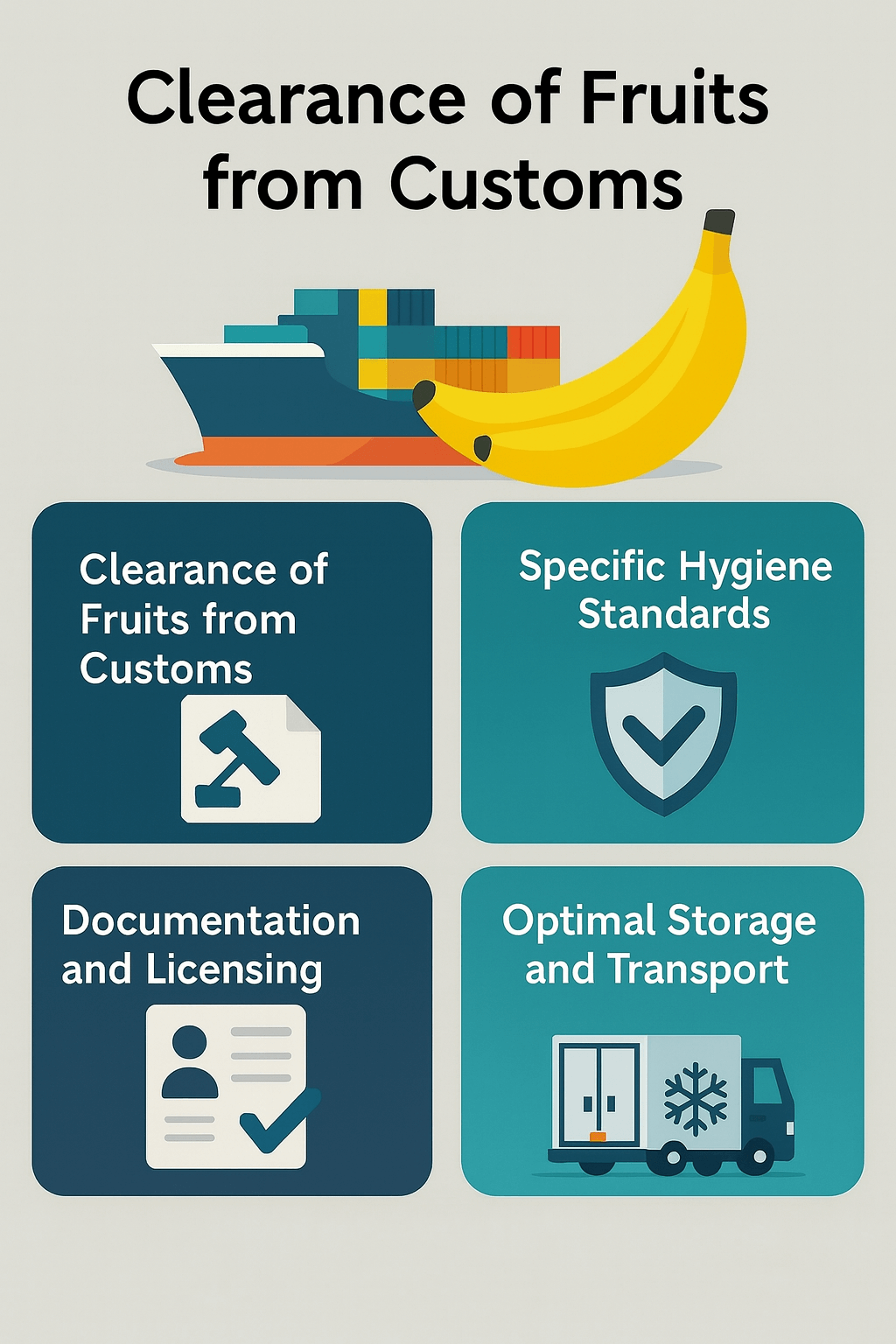Clearance of Various Fruits from Iranian Customs (HS Code + Documents & Permits)
For estimating the time and cost of clearing various fruits, contact the experts at Saba Tarkhis.
Instant free consultation
1) Documents and Standards for Fruit Clearance
Essential documents and permits for clearing fruits
- Phytosanitary certificate: Issued by the health authorities of the origin country, confirming that imported fruits are free from any pests, insects, or plant diseases. This certificate is highly important as it ensures product health and prevents the entry of pests into the country.
- Permit from the Ministry of Agriculture Jihad: For importing fruits into Iran, obtaining a permit from the Ministry of Agriculture Jihad is mandatory. This permit is issued based on quality and sanitary inspections and indicates compliance of fruits with national and international standards.
- Quarantine certificate: When the product requires additional checks, a quarantine certificate is issued after the necessary tests. This certificate is necessary for some fruits such as citrus and apples.
- Customs declaration: One of the most important documents specifying full information about the type, weight, value, and destination of fruits. It must be accurately completed and submitted to customs.
- Certificate of origin: Indicates the producing country and is essential for assessing customs tariff rates and other legal requirements.
Documents required for fruit clearance
2) Tariff, Transportation, and Scheduling
Customs tariffs and HS codes for fruits
| Fruit | Short description | HS Code |
|---|---|---|
| Banana | Fresh or dried | 08030010 / 0803 |
| Apple | Fresh apples | 08081000 / 080810 |
| Mango | Fresh or dried | 08045010 / 080450 |
| Orange | Fresh or dried | 080510 |
| Grape | Fresh grapes | 080610 |
| Kiwifruit | Fresh kiwifruit | 081050 |
| Avocado | Fresh or dried | 080440 |
| Coconut | Fresh or dried | 080119 |
| Pineapple | Fresh or dried | 080430 |
* Exact classification may vary by species, grading, fresh/dried status, packaging, origin, and quarantine requirements.
Optimal storage and transportation of fruits
Importance of timing in fruit clearance
3) Market, Trade, and Services
Iran and global markets in fruit import/export
Types of imported fruits (samples)
- 1. Banana
Tariff code: 0803 — Description: fresh or dried bananas — Exporting countries: Ecuador, Philippines, India, Turkey — Features: imports under market-regulation oversight. - 2. Apple
Tariff code: 080810 Description: fresh apples Exporting countries: Turkey, China, Poland Features: strategic product; seasonal imports to meet demand. - 3. Orange
Tariff code: 080510 Description: fresh or dried oranges Exporting countries: Turkey, Egypt, Spain Features: important for supplying vitamin C; import management to support domestic production. - 4. Grape
Tariff code: 080610 Description: fresh grapes Exporting countries: India, Turkey, Chile Features: transport-sensitive; requires a reliable cold chain. - 5. Kiwifruit
Tariff code: 081050 Description: fresh kiwifruit Exporting countries: New Zealand, Italy, Turkey Features: longer shelf life if optimal temperature is maintained. - 6. Mango
Tariff code: 080450 Description: fresh or dried mangoes Exporting countries: India, Pakistan, Philippines Features: popular and high-consumption; requires fast transport. - 7. Lemon
Tariff code: 080550 Description: fresh/dried lemon Exporting countries: Turkey, Mexico, Spain Features: imports during low domestic production seasons. - 8. Avocado
Tariff code: 080440 Description: fresh/dried avocado Exporting countries: Mexico, Peru, Chile Features: rising demand in healthy diets. - 9. Coconut
Tariff code: 080119 Description: fresh/dried coconut Exporting countries: Indonesia, Philippines, India Features: wide industrial and household applications. - 10. Pineapple
Tariff code: 080430 Description: fresh/dried pineapple Exporting countries: Philippines, Thailand, Costa Rica Features: requires fast clearance to preserve quality.
Main importers and exporters of fruit to/from Iran
Volume of fruit imports and exports to Iran
Global fruit trade turnover and key players
Need precise HS codes, quarantine permits, and a fast clearance plan? Our team manages your case end-to-end.
Submit proforma requestFrequently Asked Questions
What documents are required to clear fruits?
Phytosanitary certificate, Ministry of Agriculture Jihad permit, quarantine certificate (if needed), customs declaration, certificate of origin, commercial invoice, packing list, bill of lading, standard certificate, insurance certificate, and other necessary permits.
What are the HS Codes for popular fruits?
Banana: 08030010, Apple: 08081000, Mango: 08045010, Orange: 080510, Grape: 080610, Kiwifruit: 081050, Avocado: 080440, Coconut: 080119, Pineapple: 080430.
What are the optimal transport conditions for fruits?
Use reefer containers with real-time temperature monitoring, maintain optimal temperatures for each fruit, apply standard packaging, and ensure rapid clearance to prevent quality loss.
Why is timing critical in fruit clearance?
Fruits are perishable; any delay can cause quality decline or spoilage. Preparing documents and fast process tracking lowers the risk of financial losses.
Saba Brokerage’s Special Services for Fruit Clearance
As one of the leading clearance service providers, Saba offers special services for clearing various fruits from customs. These services include a set of stages such as specialized consulting, obtaining necessary permits, completing and registering customs declarations, and coordinating with governmental and international bodies, all of which help expedite the clearance process.
- Extensive experience and expertise: With years of experience in clearing perishables—especially fruits—the company is well acquainted with process details and challenges and provides the best solutions to accelerate clearance.
- Facilitating permit acquisition: Through close cooperation with sanitary and quarantine bodies, Saba streamlines obtaining required permits and, by timely submission of documents, prevents any clearance delays.
- Accurate and rapid follow-up: Using the company’s services, all clearance stages are tracked with high accuracy and speed, and goods are released from customs in the shortest possible time.
- Coordination with international bodies: With broad international cooperation and access to a network of trade relations, the company executes all stages in line with global standards.
- Advanced technologies: Using modern technologies enables customers to track clearance status online and receive real-time information.
For more information, contact our experts.
.png)
